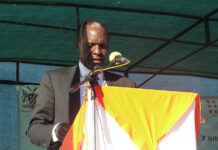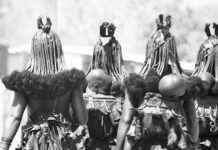By Shinovene Immanuel | 20 December 2019
A PERSON familiar with the ongoing fishing scandal briefed us in May this year that there was a major corruption investigation that might lead to the arrest of prominent Namibians by the end of this year.
It piqued my curiosity. What was it about? Who was implicated?
One thing I’ve learned in this profession is that you sometimes have to wait for things to unfold, instead of rushing the story; to follow the thread until the big picture becomes clear. Seven months later, The Namibian joined forces with Wikileaks, Al Jazeera’s Investigative Unit, RUV and Stundin from Iceland, and Wikileaks in a major expose of high-level corruption – reaching into the very heart of the government – on the plunder of Namibia’s fishing industry. The full magnitude of the plunder of our country’s fishing resources has yet to be grasped, but has already resulted in the arrest of high-profile Namibians.
This includes fisheries minister Bernhard Esau, justice minister Sacky Shanghala and Investec Asset Management Namibia managing director James Hatuikulipi – who resigned and were arrested for corruption and money laundering in a case known as the ‘Fishrot’ scandal, which also implicates the ruling party Swapo.
The Namibian has tracked this fishing story since 2014. The saga started playing out in public around September this year when businesswoman Sharon Neumbo sued their Icelandic business partners to prevent them selling a fishing vessel worth N$400 million they jointly own.
Things started getting dirty around September when police arrested Neumbo. This was a day after she asked the police to investigate the alleged illegal transfer of N$60 million from a fishing company she co-owns.
The N$60 million was transferred to Mermaria Seafoods Namibia, an Icelandic company owned by Samherji, an entity accused of bribing Namibian officials.
The people who sued her at the time were said to be in the same camp as the Fishrot 6.
“Sources fear that businesswoman Sharon Neumbo’s arrest could be a tit-for-tat move by a politically aligned clique of business people, who want to stop her from cooperating with investigations into questionable fishing deals” we reported in the September article relating to that arrest.
Other newspapers attempted to discredit Neumbo, who was arrested for taking out a N$230 000 loan from a fishing company she co-owns. But we already knew at the time that her arrest was linked to the fishing scandal, and that there were journalists working on a scandal called Fishrot.
The Namibian started reporting on this issue long ago. A couple of other newspapers also picked up on it. Fellow reporter Ndanki Kahiurika was part of the team which reported in the middle of 2017 that Esau questionably appointed Hatuikulipi on the Fishcor board.
Hatuikulipi – a cousin of Esau’s son-in-law Tamson ‘Fitty’ Hatuikulipi– reacted strongly to that story at the time, and threatened to sue The Namibian because of the article. The Namibian stood its ground, and instead turned his threat into an article. For The Namibian, the Fishrot scandal summed up a successful year of investigative journalism, even if it took years.
Going after one of the most powerful groups of people in Namibia is not easy. In fact, we braced ourselves for possible lawsuits, even before publication. From our side, we pulled out all the stops to ensure total accuracy.
Every sentence was read and reread. The article was checked and cross-checked for factual accuracy, contextual accuracy, and for tone. We then had our lawyers go through it with a fine-tooth comb.
It took sleepless nights and teamwork, including editing by The Namibian’s editor Tangeni Amupadhi, the brilliant Jean Sutherland, and the tireless work of people who mostly do their work away from the public.
FAST START
2019 started off on a high note for The Namibian’s investigative unit.
We reported how parliamentarians, government officials, councillors, police bosses, traditional leaders and church leaders ranked among 230 individuals who want to cut down around 200 000 rare trees in Kavango East.
This is more than the combined size of Namibia’s capital Windhoek (513 300 hectares) and Okahandja (16 420 hectares).
That same month, we reported on how senior government officials reportedly discussed a proposal to install a N$1 million elevator at the state-owned house of former vice president Nickey Iyambo.
The presidency initially denied this transaction, but admitted a few weeks later that the story was correct.
In April, The Namibian reported how the government had spent N$43 million upgrading former president Sam Nujoma’s private house.
The same month also saw us reporting on how more than 30 mining companies – which earned about N$85 billion from selling Namibian minerals – paid only N$1 billion in corporate tax between 2012 and 2017.
In May, we reported how the government is increasingly relying on the Government Institutions Pension Fund (GIPF) to pay for its operational budget shortfalls.
That month, we reported that the health ministry has ordered the release of a controversial consignment of HIV-AIDS medicine, despite an earlier decision that it should be shipped back to its manufacturers in China because of poor quality.
One of the biggest lessons we learned this year is that investigative journalism can thrive and help inform the public better if whistleblowers share their information with the media.
Icelandic whistleblower Jóhannes Stefánsson’s information helped the media tell the Fishrot scandal.
Stefánsson’s information could help Namibia track transactions worth more than N$2,5 billion in the fishing industry.
We’ll continue in 2020. Many of our readers have access to newsworthy information or documents they may want to share with us to expose wrongdoing. Help us write better stories by contacting us or ask someone to drop off documents at our offices.
Alternatively, email us with a secure mail: investigations@namibian.com.na






